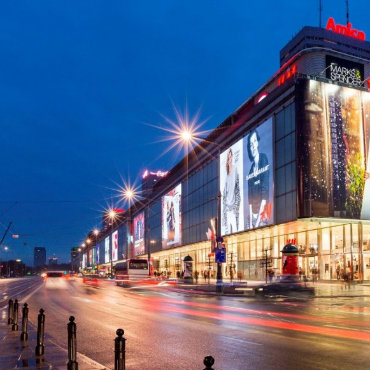
Wars, Sawa and Junior shopping center, Warsaw, Poland (Atrium, Public domain)
Although the total volume of recorded transactions in the region actually decreased by 0.9 per cent, a significant increase in the value of those transactions was made possible thanks to a number of mega deals. The highest number of deals were made in Russia (605), followed by Poland (323), Turkey (193), Czech Republic (188), and Romania (130). The most attractive sectors were: real estate and construction (432 deals), manufacturing (285 deals), telecoms & IT (279 deals) and services (175 deals).
Top foreign investor in the emerging Europe in terms of value of investments in 2018 was the United Kingdom with deals worth EUR9.77bn. In terms of volume, United States was at the top of the table with 89 deals. “Strong economic growth across emerging Europe combined with a stable international economy for most of the year created a conducive environment for deal-making in 2018,” the authors of the report wrote.
However, in spite of the fact that countries like Russia or Poland were the best with total amount of deals concluded, they actually both registered a downward investment activity. “The largest economy, Russia, once again enjoyed the highest number of deals (605), but that was 10 per cent down on the previous year and the lowest since this report was first published in 2012,” the CMS wrote.
Poland was the second most appealing country for international investors in 2018 attracting 323 deals. But, similarly to Russia, the value of deals was down 39 per cent to the EUR6.49bn. Unlike Poland or Russia, the Czech Republic enjoyed growth in both deal numbers and total deal value in 2018. While deal numbers were up by 6.8 per cent, the total deal value reached the EUR5.4bn, an increase by 25.2 per cent y/y.
Megadeals and sectors
In most countries across the region the investment activity was mainly driven by a number of megadeals. In Hungary, for instance, overall deal values rose by 70.5 per cent to the EUR4.61bn, six times the level of 2012. However, at the same time, the volume of deals decreased by 22.5 per cent. According to CMS “Hungary was one of a number of countries where transaction values were distorted by a series of megadeals in telecoms that had an impact across the region”.
Not just in Hungary, but across the whole region, telecommunications and IT sector attracted the highest amount of megadeals, topping the table by deal valuation at the EUR18.18bn. “There were fewer deals in the sector, but they accounted for four of the region’s largest deals, led by the purchase of Liberty Global’s operations in the region by Vodafone Group of the UK for an estimated the EUR6.07bn,” authors of the report wrote. “Telenor assets were sold to PPF Group of the Czech Republic for the EUR2.8bn and assets of United Group were sold to BC Partners of the UK for the EUR1.9bn. An exception to the consolidation trend was Turk Telekom where a consortium of Turkish banks took a majority stake for the EUR4.2bn as part of a debt restructuring.”
Although the real estate and construction didn’t see as many megadeals as telecommunications and IT, it was the most active sector in the region with the number of deals rising by 10.8 per cent in 2018. Seven of the 20 biggest property deals in the region were in Poland. “Wars, Sawa and Junior shopping center was bought by Atrium European Real Estate of Austria for the EUR301.5m, and two buildings in Warsaw’s Gdanski Business Center were bought by Savills of the UK for the EUR200m. Six of the top 20 deals involved UK or US buyers.”
Foreign vs. regional investors
One the most notable developments in emerging Europe last year was the drop of Chinese investment activity in the region, at least in terms of overall deal valuation. “One of the features of 2017 was that China was the largest foreign investor by value, lifted by the CEFC China Energy — Rosneft deal which subsequently fell through as CEFC’s global expansion began to unravel amid concerns about its debt levels. As expected, without that to bolster the numbers, China slipped down the league table of biggest foreign investors in 2018, from first to fifth place,” the report reads.
That being said, this by no means should be read as signifying China’s departure from European markets. The contrary is true. “China is now firmly established as a major player in the region, whether through one-off investments or projects that form part of the country’s One Belt One Road initiative,” wrote CMS. China’s position in Europe can only be threatened by the number of ongoing investigations being conducted both in Europe and in China itself.
“Enthusiasm for Chinese investment may be tempered by events at the CEFC conglomerate, including an investigation by Beijing authorities into alleged economic crimes by founder Ye Jianming who spearheaded an investment push into the Czech Republic, ranging from a football club to a brewery,” CMS added.
Although China has become an important investor in Europe, it is still lagging behind countries like the United States or the United Kingdom. It is the former that was the largest foreign investor in the region by value, mostly due to a number of deals in telecommunications. In terms of number of transactions, the USA toped their transatlantic partner.
Besides the two English-speaking countries, the region saw a significant increase in the level of deal activity involving European countries, such as Germany, Austria, France, Sweden and Italy. Outside of Europe, the most notable trade partners included Qatar, UAE and Japan.
Another trend that has become visible in the recent years is the increase in domestic investment activity. “Although we continue to see more inbound than outbound activity, a growing number of emerging European companies are broadening their horizons as they grow in size and confidence. Each year sees more companies looking abroad for growth,” CMS stressed.
The full report can be found here.
Filip Brokeš is an analyst and a journalist specializing in international relations.


